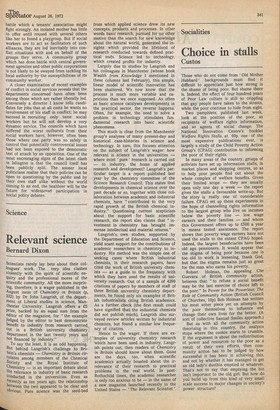Socialities
Choice in stalls custos
Those who do not come from 'Old Mother Hubbard' backgrounds must find it difficult to appreciate just how strong is the shame of being poor. But shame there is. Indeed, the effect of four hundred years of Poor Law culture is still so crippling that gay people have taken to the streets, while the poor continue to hide from sight.
Two pamphlets, published last week, look at the position of the poor, as recipients of welfare rights information, and as agents of social change. The National Innovation Centre's booklet Welfare Rights Stalls, at 60p one of the most expensive publications ever, is largely a study of the Child Poverty Action Group's (CPAG) contribution to informing the poor of their rights.
In many areas of the country, groups of activists have set up information stalls, in market places and shopping centres, so as to help poor people find out about the whole complex of welfare benefits. Given their limited scope — they are usually open only one day a week — the report gives the stalls a favourable write-up. But the story is really one of considerable failure. CPAG set up these experiments in the hope of channelling rights information to the largest group who live on incomes below the poverty line — low wage earners and their families — and whom this Government offers up to £500 a year in means tested assistance. The report shows that poverty wage earners have not used the stalls to the extent CPAG hoped. Indeed, the largest beneficiaries have been old age pensioners. It would appear that the stigma of being poor because one is too old to work is lessening, thank God, but that the stigma remains just as great for the man who earns his poverty.
Robert Holman, the appealing Che Guevara of British community action, believes that "to refuse a social benefit may be the last exercise of choice left to the poor." In Power for the Powerless: The Role of Community Action (British Council of Churches, 10p) Bob Holman has written his most sober piece yet on attempts by the poor themselves to influence and change their own lives for the better. (A sort of collective Samuel Smiles approach.) But as with all the community action theorising in this country, the analysis stops where the cookie starts to crumble. If the argument is about the redistribution of power and resources to the poor as a result of their own efforts, then community action has to be judged by how successful it has been in achieving this, and not by whether it has managed to get an old lady's dustbin emptied or whatever. That's not to say that emptying the bin isn't important to the old, girl. But how do you build up from this kind of very small scale success to major changes in society's power structure?










































 Previous page
Previous page